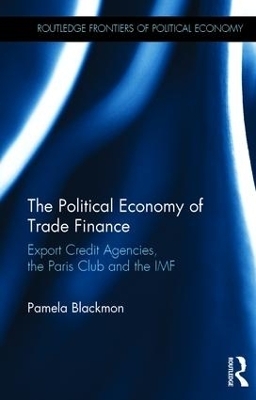
The Political Economy of Trade Finance
Export Credit Agencies, the Paris Club and the IMF
Seiten
2017
Routledge (Verlag)
978-1-138-78056-9 (ISBN)
Routledge (Verlag)
978-1-138-78056-9 (ISBN)
Export Credit Agencies provide insurance and guarantees to domestic firms in the event that payment is not received from an importer. Thus, ECAs reduce uncertainties domestic firms face in exporting their goods. Most countries have ECAs that operate as official or quasi-official branches of their governments and they therefore represent an important part of government strategies to facilitate trade, promote domestic industry and distribute foreign aid.
The Political Economy of Trade Finance provides a detailed analysis as to how firms use the medium and longer-term financing provided by ECAs to export goods to developing countries. It also explains how ECA arrears have contributed to the debt of developing countries and illustrates how the commercial interests of ECA activity are evident in decisions about IMF arrangements and related to Paris Club debt rescheduling agreements. Finally, the book documents how the medium and longer-term export credit insurance support provided by the G-7 ECAs was a central component in mitigating steep declines in international trade during the 2008 Global Financial Crisis. This book is of great interest to both academics and students in the field of political economy, finance and politics of international trade. It is also of importance to policy makers.
The Political Economy of Trade Finance provides a detailed analysis as to how firms use the medium and longer-term financing provided by ECAs to export goods to developing countries. It also explains how ECA arrears have contributed to the debt of developing countries and illustrates how the commercial interests of ECA activity are evident in decisions about IMF arrangements and related to Paris Club debt rescheduling agreements. Finally, the book documents how the medium and longer-term export credit insurance support provided by the G-7 ECAs was a central component in mitigating steep declines in international trade during the 2008 Global Financial Crisis. This book is of great interest to both academics and students in the field of political economy, finance and politics of international trade. It is also of importance to policy makers.
Pamela Blackmon is Associate Professor at the Department of Political Science, Pennsylvania State University, Altoona, USA. Her research focuses on the policies of the international financial institutions, and she is currently examining the role of ECAs in international trade and finance.
Introduction
Chapter 1: Insuring and Financing Trade
Chapter 2: Exporting Goods to Developing Countries
Chapter 3: Paris Club Debt Rescheduling and the HIPC Initiative
Chapter 4: The Cyclical Process: the IMF, Debt Rescheduling and Export Credits
Chapter 5: Increasing Trade during the Crisis
Conclusion
| Erscheinungsdatum | 24.05.2016 |
|---|---|
| Reihe/Serie | Routledge Frontiers of Political Economy |
| Zusatzinfo | 11 Tables, black and white; 10 Line drawings, black and white; 10 Illustrations, black and white |
| Verlagsort | London |
| Sprache | englisch |
| Maße | 138 x 216 mm |
| Gewicht | 294 g |
| Themenwelt | Sozialwissenschaften ► Politik / Verwaltung |
| Betriebswirtschaft / Management ► Spezielle Betriebswirtschaftslehre ► Bankbetriebslehre | |
| Wirtschaft ► Volkswirtschaftslehre ► Makroökonomie | |
| Wirtschaft ► Volkswirtschaftslehre ► Wirtschaftspolitik | |
| ISBN-10 | 1-138-78056-1 / 1138780561 |
| ISBN-13 | 978-1-138-78056-9 / 9781138780569 |
| Zustand | Neuware |
| Haben Sie eine Frage zum Produkt? |
Mehr entdecken
aus dem Bereich
aus dem Bereich
warum unser Geld stirbt und wie Sie davon profitieren
Buch | Hardcover (2024)
FinanzBuch (Verlag)
CHF 41,95
denken und handeln wie ein professioneller Trader
Buch | Softcover (2023)
Vahlen, Franz (Verlag)
CHF 51,65


